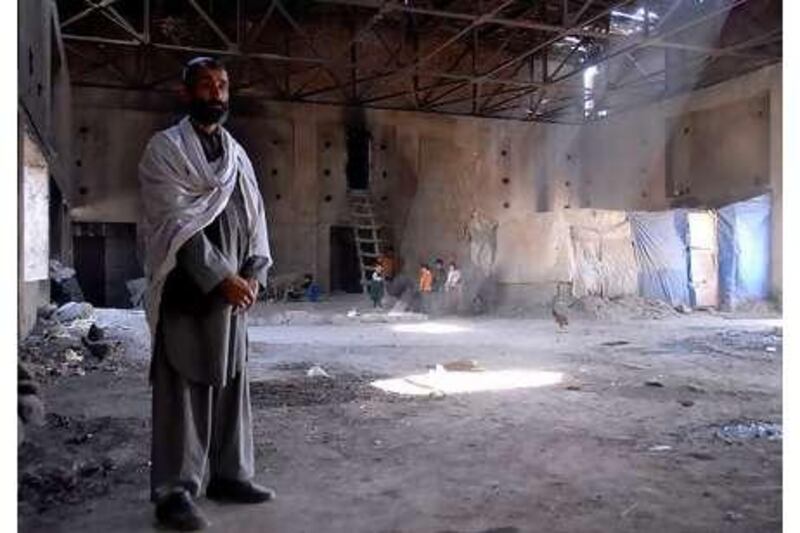KABUL // A collective shrug of the shoulders was Kabul's response to the news that Barack Obama will be the next US president, with Afghans still deeply suspicious of US intentions toward their country. The wave of euphoria that swept over much of the world was absent here, as growing insecurity and endemic poverty continue to take their toll. Many people did not even know there had been an election. Others warned that plans to send thousands more troops to the region could backfire horribly, triggering the kind of resistance once faced by the Soviet Union. Hamid Karzai, the Afghan president, congratulated Mr Obama on his victory before urging him to stop the civilian death toll from rising. At the same time, reports from the southern province of Kandahar indicated several innocent people had been killed following an air strike on a wedding party. "My first demand from the US president, when he takes office, would be to end civilian casualties in Afghanistan and take the war to places where there are terrorist nests and training centres," Mr Karzai said at a press conference. Afghanistan was a key issue in Mr Obama's successful attempt to reach the White House, as he described the situation here as "precarious and urgent". His one and only visit to the country came during his campaign and he has repeatedly stated that America should have concentrated on this war rather than going into Iraq. Said Ahmad Najib Mahmood, who teaches world political history at Kabul University, said US policy had been a failure and a massive change in approach was now needed. "In these six or seven years, there has been an increase in kidnappings, suicide attacks and narcotics production. That shows they have lots of problems," he said. Prof Mahmood said the United States had been motivated to invade Afghanistan partly because of its strategic location, a theory that is widely believed among the population. He said more emphasis must be put on cutting unemployment and training the local security forces. "Americans do not understand the sociology of Afghanistan. They do not know what Afghan people are like, what they want or how to talk to them," he said. While Mr Obama has pledged to provide extra money and effort towards economic and social development, the cornerstone of his strategy is a plan to add at least two or three combat brigades to the 32,000 US troops already in the country. Mullah Abdul Salam Rocketi, a former Taliban commander and now an MP, said this suggested the Democrat had no intention of bringing peace. "If the Americans send some engineers, we know they are here for reconstruction. If they send some doctors, we know they are here to work in hospitals. If they send some soldiers then we know they are here to fight," he said. Mullah Rocketi called on Mr Obama to attempt negotiations with all Afghan sections of the insurgency, including such leaders as Mullah Mohammed Omar, Gulbuddin Hekmatyar and Jalaluddin Haqqani. Despite expressing a willingness to talk to some rebels, the US president-elect already appears to have ruled out dialogue with the top militants. People here know they will continue to suffer, whatever yesterday's election result. Decades of war have left the country in ruins. Even for houses in the capital, there is no regular electricity supply and often no running water. Meanwhile, criminal activity is spreading and the Taliban have control only a few kilometres from the heart of government. Gul Hassan lives with his family in one of Kabul's many derelict buildings. It is a dark, damp place that cannot keep the cold out during winter. Having fought against the Soviets, he is pretty sure what will happen when Mr Obama takes office. "The situation will get very bad if more troops are coming. It will be much worse than it was for the Russians," he said. For the vast majority in Afghanistan, Mr Obama's historic election in the United States is meaningless. What counts for them are the immediate concerns of getting enough food to eat and somehow staying alive. Mahgul, a mother of seven from Panjshir province, returned to Afghanistan after being kicked out of Pakistan three years ago. Her home is another decaying old building, surrounded by overgrown grass and wreckage from the civil war. "There are no jobs, my husband sells fruit and vegetables from a cart in the street and makes one dollar a day," she said. "I don't know anything about the elections in America. I never listen to the radio and I don't care." csands@thenational.ae
Suspicion, apathy and a plea for change
Afghans are still deeply suspicious of US intentions toward their country and shrug their shoulders at Obama's victory.

Editor's picks
More from the national




